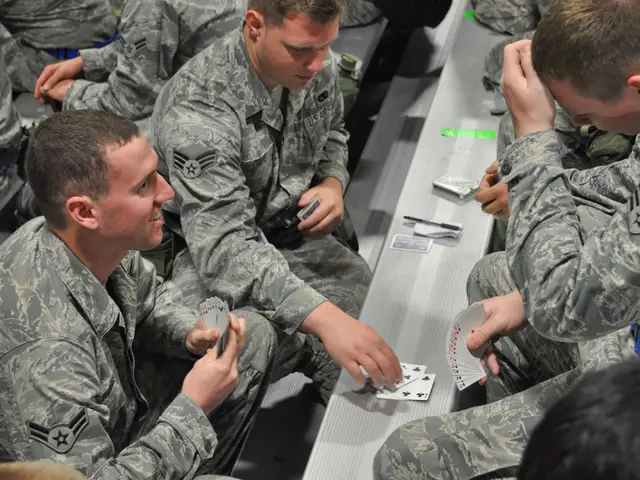Mastering Poker Against Weak Opponents: A Guide
Challenging an amateur poker game.
If you're serious about excelling in poker games, it's essential to comprehend your competitors. This means paying close attention to the playing style and behavior of players at the table. Here's a breakdown of how to spot weak players and capitalize on their tendencies:
Player Characteristics
To pinpoint potential weak players, start by assessing who you're up against:
- Attire and Demeanor: Players who are conservatively dressed might adopt a similar conservative play style. On the other hand, individuals who arrive with flashy attire are often fans of aggressive and versatile play styles.
- Vocal Cues: Soft and timid speakers tend to display similar cautious behavior. Fierce speakers, however, usually play aggressively.
- Hand Selection: Keep an eye for players who seem eager to see the flop in many hands. These may be inexperienced or aggressive players who make frequent betting mistakes.
- Betting Patterns: Pay attention to whether a player prefers raising over checking and calling. Aggressive players typically raise in situations where weak players tend to check or call.
After spotting weak players, adjust your strategy accordingly.
Psychology Insights
On the flop, there are three likely scenarios:
- If the weak player bets on the flop, they likely hold a strong hand. In this case, avoid raising to intimidate them, but call their bet instead to draw them into the game and maximize their contributions by the river.
- If the weak player checks, always bet! There's a 90% chance they'll fold.
- If your opponent employs a "check-raise" tactic, fold your weaker hands immediately.
Over time, you'll effortlessly gather information about their cards and play styles. Typically, weak players have a shallow strategy: they check and call with strong hands (high pairs, flush draws, straight draws) and reserve raises for exceptional hands.
As the saying goes, "Be aggressive against a weak player, but tread carefully if they show signs of aggression!" Stick to this advice, and you'll be well on your way to turning the odds in your favor at the poker table! Good luck! :)
Enrichment Data
Identifying and exploiting weak poker players can significantly improve your game. Below, we provide additional insights on spotting and playing against them:
Playing Style
- Overplaying Weak Hands: Weak players are prone to calling with a wide range of weaker hands, including marginal hands and even garbage hands. This makes them vulnerable to aggressive play tactics.
- Passive Play: Inexperienced players often limp in and seldom raise, making it challenging for them to build pots or protect their equity. Aggressive players can capitalize on this passivity by raising more frequently.
- Short Stacks: Less confident players or those with inadequate bankroll management might buy in for lesser amounts than the table maximum.
Speech and Verbal Behavior
- Verbal Tells: Signs of frustration, such as complaining about bad luck, can indicate that the player is experiencing tilt, which affects decision-making abilities.
- Lack of Communication: Inexperienced players may be hesitant to engage in conversation, which can hinder their ability to feign confidence or mislead opponents.
Attire (Less Relevant)
While attire may offer some insights about a player's confidence or demeanor, it is not a reliable indicator of their skill level. Unusual attire might occasionally reflect a player's personality or confidence level. Instead, focus on the playing style and verbal behavior to devise an effective strategy.
- What is the best strategy when a weak player bets on the flop in poker against weak opponents? Avoid raising to intimidate, instead call their bet to draw them into the game and maximize contributions by the river.
- Poker players who exhibit timid speech often display cautious behavior, making them potential weak opponents.
- To exploit weak players in a casino, pay attention to their betting patterns - aggressive players typically raise in situations where weak players tend to check or call.
- Identifying players who isolate themselves at a casino-and-gambling establishment could potentially reveal inexperience or timidity, making them targets for exploitation in poker games.
- Overplaying weaker hands is common among weaker poker players, who may call with a wide range of weaker hands, including marginal hands and even garbage hands. This makes them vulnerable to aggressive play tactics.





